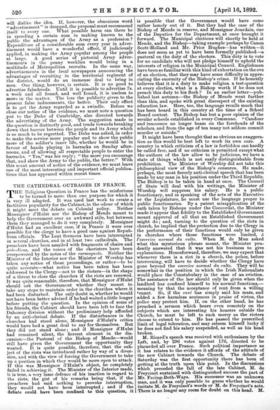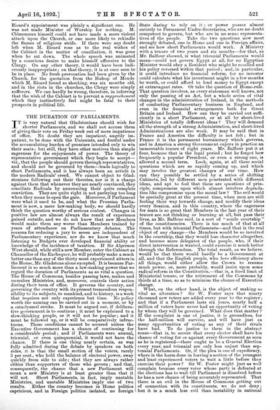THE CATHEDRAL OUTRAGES IN FRANCE. T HE Religious Question in France
has the misfortune to be turned to more than one purpose for which it is very ill adapted. It was used last week to create a factitious popularity for the Cabinet, in the odour of which it might meet the debate on Colonial policy. Neither Monsignor d'Hulst nor the Bishop of Mende meant to help the Government over an awkward stile, but between them they managed to do it very completely. Monsignor d'Hulst had an excellent case, if in France it were ever possible for the clergy to have a good case against Repub- lican officials. The Lent Sermons have been interrupted in several churches, and in at least two cathedrals. The preachers have been assailed with fragments of chairs and prie-dieus, and the voices of the choristers have been overpowered by the notes of the carmagnole. Neither the Minister of the Interior nor the Minister of Worship has taken any notice of these proceedings, or rather—to be quite accurate—what notice has been taken has been addressed to the Clergy—not to the rioters—in the shape of a threat to close the churches if the riots are renewed. It was quite reasonable, therefore, that Monsignor d'Hulst should ask the Government whether they meant to take any steps to maintain order in the churches where it had been disturbed. The only doubt is, whether he would not have been better advised if he had waited a little longer before putting the question. In the opinion of some of his friends, the Cabinet should have been left to face the Dahomey division without the preliminary help afforded by an anti-clerical debate. If the disturbances in the churches had stood alone, Monsignor d'Hulst's critics -would have had a great deal to say for themselves. But they did not stand alone ; and if Monsignor d'Hulst had remained silent, the fiercest element in the dis- cussion—the Pastoral of the Bishop of Mende—would still have given the Government the opportunity They wanted. It is quite possible, therefore, that the sub- ject of the riots was introduced rather by way of a diver- sion, and with the view of forcing the Government to take up a position in 'which they would be more open to attack. If this was Monsignor d'Hulst's object, he completely failed in achieving it. The Minister of the Interior made, it is true, a very lame defence of his inaction in regard to the riots, the gist of his remarks being that, if the preachers had said nothing to provoke interruption, they would not have been interrupted ; and if the debate could have been confined to this question, it is possible that the Government would have come rather lamely out of it. But they had the case of the Bishop of Mende in reserve, and Monsignor Jourdain, one of the Deputies for the Department, at once brought it forward. The Municipal elections will shortly be held at Mende, and the Bishop—taking example perhaps by Canon Scott-Holland and Mr. Price Hughes—has written—it does not seem as yet to have been formally published—a pastoral on the duty of the electors. This duty is to vote for no candidate who will not pledge himself to uphold the interests of religion in the Municipal Council. Englishmen have been so familiar with this kind of exhortation on the eve of an election, that they may have some difficulty in appre- ciating the enormity of the Bishop's crime. If he honestly believes that it is a duty to make religion a test-question at every election, what is a Bishop worth if he does not preach this duty to his flock ? In an earlier letter—pub- lished last autumn—the Bishop of Mende went further than this, and spoke with great disrespect of the existing education law. Here, too, the language recalls much that has been heard in this country at the time of a School Board contest. The Bishop has but a poor opinion of the secular schools established in every Commune. "Candour and innocence no longer beam on the foreheads of the scholars, and from the age of ten many not seldom commit murder or suicide."
It might have been thought that so obvious an exaggera- tion as this would be best left to work its own cure. A country in which criticism of a law is forbidden can hardly be called free, and if no criticism is permitted except what the authors of the law allow to be judicious, we have a state of things which is not easily distinguishable from prohibition. The Minister of Worship did not take this philosophical view of the Bishop's censures. He made, perhaps, the most fiercely anti-clerical speech that has been made by any man in his position under the Third Republic. The Bishop is to be taken in hand at once. The Council of State will deal with his writings, the Minister of Worship will suppress his salary. He is a public functionary, and in speaking of the acts of the Executive or the Legislature, he must use the language proper to public functionaries. By a patent misapplication of the oath taken by Bishops under the Concordat, the Minister made it appear that fidelity to the Established Government meant approval of all that an Established Government might do ; and, turning to the question of the riots in church, he implied that the protection due to the Clergy in the performance of their functions would only be given in churches where those functions were limited, r exercice normal du culte. When M. de Mun asked what this mysterious phrase meant, the Minister pru- dently answered that it was not his business to give explanations. Henceforward, therefore, we may expect that whenever there is a riot in a church, the police, before intervening, will have to decide whether the Clergy have gone beyond the exercice normal du cults. They will be somewhat in the position in which the Irish Nationalists would place the Constabulary in the case of an eviction. The assistance of the law should only be given when the landlord has confined himself to his normal functions,— meaning by that the acceptance of rent from a willing 4-enant. So, if the cure has simply said his mass, and. added a few harmless sentences in praise of virtue, the police may protect him. If, on the other hand, he has preached a. sermon which bears even remotely on the subjects which are interesting his hearers outside the Church, he must be left to such mercy as the rioters choose to extend to him. He has passed the prescribed limit of legal toleration, and may esteem himself lucky if he does not find his salary suspended, as well as his head broken.
M. Ricard's speech was received with enthusiasm by the Left, and, by 296 votes against 176, directed to be placarded all over France. Such political importance as it has relates to the evidence it affords of the attitude of the new Cabinet towards the Church. The debate of Saturday was the first opportunity there has been of getting at the truth upon this point. In the discussions which preceded the fall of the late Cabinet, M. de Freycinet sustained with distinguished success the part of Mr. Facing-Both-Ways. His successor was an unknown man, and it was only possible to guess whether he would imitate M. de Freycinet's words or M. de Freycinet's acts. There is no longer any room for doubt on this head. M. Ricard's appointment was plainly a significant one. He was not made Minister of Worship for nothing. M. Cl4menceau himself could not have made a more violent attack upon the Church, or one more likely to rekindle the flames of religious strife. If there were any doubt left when M. Ricard rose as to the real wishes of the Cabinet in the matter of conciliation, it was gone when he sat down. The whole speech was animated by a conscious desire to make himself offensive to the Clergy. On any other theory, it would have been ludi- crously inappropriate ; on that theory, it is at once seen to be in place. No fresh provocation had been given by the Church, for the quotation from the Bishop of Mende which M. Ricard found so shocking, was six months old, and in the riots in the churches, the Clergy were simply sufferers. We can hardly be wrong, therefore, in inferring that the wish of the Cabinet is to prevent a rapprochement which they instinctively feel might be fatal to their prospects in political life.

































 Previous page
Previous page